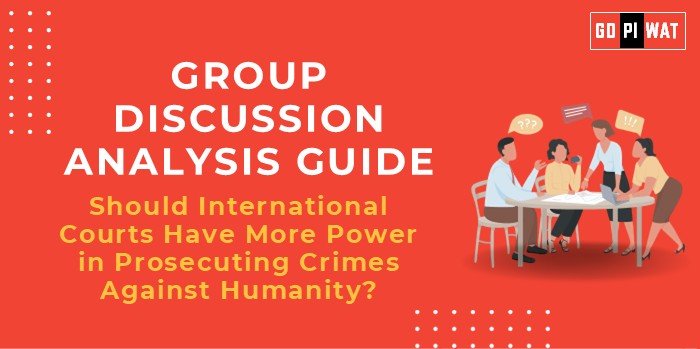📋 Group Discussion (GD) Analysis Guide
⚖️ Should International Courts Have More Power in Prosecuting Crimes Against Humanity?
🌍 Introduction to the Topic
📖 Opening Context
Crimes against humanity, such as genocide, war crimes, and systemic human rights abuses, continue to plague societies globally. Institutions like the International Criminal Court (ICC) aim to bring perpetrators to justice, yet their limited jurisdiction and enforcement mechanisms often hinder effectiveness.
📜 Topic Background
The ICC was established in 2002 under the Rome Statute to prosecute individuals for serious international crimes. While significant, its jurisdiction depends on states’ consent, and enforcement relies on member states’ cooperation, raising debates about empowering such courts further.
📊 Quick Facts and Key Statistics
- 🌐 Rome Statute Signatories: 123 countries (not including major powers like the USA, Russia, and China).
- ⚖️ ICC Convictions: Only five convictions since 2002, highlighting operational challenges.
- 📊 Global Refugee Impact: Over 35 million people displaced by crimes against humanity (UNHCR, 2023).
- 🌍 Non-Participation: 70+ countries, including populous nations like India and Indonesia, are non-members of the ICC.
- 💰 Cost of Operations: ICC’s annual budget exceeds €170 million, underscoring resource intensity.
🤝 Stakeholders and Their Roles
- 🏛️ Governments: Ratify international treaties and facilitate cooperation with courts.
- 🌐 United Nations: Refers cases to courts (e.g., via Security Council) and ensures legitimacy.
- 🔍 NGOs: Document evidence and advocate for victims’ justice.
- 📢 Civil Societies: Promote awareness and accountability through global campaigns.
- 🛡️ Suspect Nations: Frequently oppose increased powers, citing sovereignty concerns.
🏆 Achievements and Challenges
✨ Achievements
- ✅ Global Awareness: Prosecution efforts deter potential offenders.
- ⚖️ Case Examples: Conviction of warlord Thomas Lubanga in 2012 was a landmark.
- 📖 Legal Framework Development: Strengthened international norms against impunity.
⚠️ Challenges
- 🚨 Lack of Enforcement Power: Courts rely on member states for arrests and extraditions.
- 🛡️ Sovereignty Concerns: Many nations resist conceding jurisdiction to international bodies.
- ❌ Selective Justice Allegations: Critics argue cases disproportionately target African nations.
🌍 Global Comparisons
- 🌟 Successful: The Nuremberg Trials post-WWII showcased effective international justice.
- ❌ Challenges: UN tribunals for Rwanda and Yugoslavia faced prolonged timelines and resource constraints.
📚 Case Studies
- 📖 Bosnia (1992–1995): The UN’s mixed success in peacekeeping during ethnic cleansing demonstrates the need for stronger mandates.
💡 Structured Arguments for Discussion
- ✅ Supporting Stance: “Expanding the power of international courts will strengthen global justice and prevent crimes through deterrence.”
- 🛑 Opposing Stance: “Granting more power to international courts undermines national sovereignty and risks politicization of justice.”
- ⚖️ Balanced Perspective: “While increased authority can enhance justice, mechanisms must ensure impartiality and respect state sovereignty.”
🎯 Effective Discussion Approaches
- 📊 Opening Approaches:
- Start with a powerful statistic: “Over 35 million displaced due to crimes against humanity demand justice.”
- Reference historical successes like Nuremberg to set a positive tone.
- Highlight contemporary challenges: “The ICC struggles with only five convictions in two decades.”
- ⚡ Counter-Argument Handling:
- Cite precedents where sovereignty was upheld while ensuring justice, such as hybrid courts in Cambodia.
- Stress reforms like equitable geographic representation to counter bias allegations.
🧠 Strategic Analysis: SWOT
- 💪 Strengths: Global legal framework, deterrence potential, victim advocacy.
- 🛠️ Weaknesses: Operational inefficiencies, selective prosecution allegations, sovereignty resistance.
- 🌟 Opportunities: Strengthened UN partnerships, hybrid court models, public awareness.
- ⚠️ Threats: Rising nationalism, geopolitical biases, resource constraints.
🏫 Connecting with B-School Applications
📚 Real-World Applications
- Study of global governance models in MBA strategy or public policy projects.
- Framework for negotiations or leadership during global crises.
🎓 Sample Interview Questions
- ❓ “What reforms could enhance the ICC’s effectiveness?”
- ❓ “How does global justice intersect with business ethics?”
📘 Insights for Students
- 💡 Interdisciplinary skills in diplomacy and law are valuable.
- 📖 Studying case outcomes offers insights into organizational efficacy.


